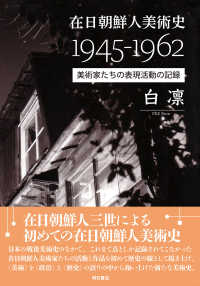- ホーム
- > 洋書
- > ドイツ書
- > Humanities, Arts & Music
- > Religion & Theology
- > christianity
Description
(Short description)
Hugenottische Gemeindediakonie - noch heute ein Vorbild für die Armenfürsorge
(Text)
Die Entwicklung des Diakonenamtes bei den Hugenotten verdeutlicht, wie sehr das Sein das Bewusstsein prägte. In Frankreich wurden die Protestanten Hugenotten genannt und jahrhundertelang verfolgt. Dies beeinflusste ihr diakonisches Engagement im Bereich der Armen- und Krankenfürsorge, das zugleich die Überlebensstrategie einer Minderheit darstellte. Zu dem spezifisch ausgeprägten Modell hugenottischer Gemeindediakonie des 16. und 17. Jahrhunderts gehörten die unmittelbare Begegnung und die soziale Eigenverantwortung. Effektivität und Rationalität auf der einen und Humanität und würdevoller Umgang auf der anderen Seite zeichneten die hugenottische Gemeindediakonie aus. In ihrer direkten Begegnung mit den Armen erwies sich die diakonische Praxis der Hugenotten als eine reale Alternative zu der Ausschließung und Marginalisierung vieler Armer, deren Fürsorge zunehmend der Staat übernommen hatte. Die Spezifika der hugenottischen Gemeindediakonie fordern deshalb auch heute diakonische Existenz und Armenpolitik heraus.
(Text)
The development of the Huguenot deaconal ministry clearly shows how much being determines consciousness. The plight of the French Protestants as a persecuted minority gave rise to a deaconal commitment to the care of the poor and the sick unlike that of the German Lutherian parishes and towns as we know it. The influence of Calvin and the City of Geneva, on the other hand, must be relativised.
The specific model of Huguenot deaconry in the 16th and 17th centuries, of which face-to-face encounters and social responsibility can be described as characteristic, is certainly not directly transferable one-to-one, but does raise questions as to the existence of the deaconry and policy measures for the poor. In the history of poor relief, which not only underwent a transition in the modern age through the takeover by the municipality and the state, but also underwent a process which resulted in the exclusion and marginalisation of many destitute, the example of the Huguenot parish deaconry represented a true alternative, combining effectiveness and rationality with humanity, the preservation of dignity and direct encounters with the troubles of the afflicted. At the same time it was a strategy for the survival of a minority.








